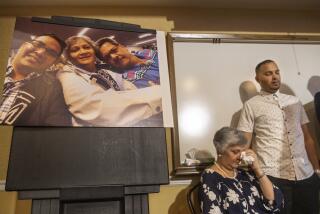Jurors can’t agree on death penalty in decades-old double killing
- Share via
A mistrial was declared Monday when jurors could not unanimously decide whether a man who ordered a kidnapping that led to two deaths in Torrance almost 20 years ago should be put to death.
Howard Bloomgarden, 46, was convicted May 15 of two counts of murder and two counts of kidnapping. Jurors also found true the special circumstance that the murders were committed during the course of a kidnapping, making him eligible for the death penalty.
The jury was split 11-1 in favor of a sentence of life in prison without the possibility of parole.
If prosecutors decide not to retry the penalty phase of the trial, a judge would be compelled to give Bloomgarden the life sentence.
Bloomgarden was convicted May 15 for the killings of Peter Kovach, 26, and Ted Gould, 29.
Kovach was a drug dealer for Bloomgarden’s cross-country operation, prosecutors said, but eventually left the ring and by many accounts had gone straight, buying a stake in a telecommunications store in Torrance in an attempt to start a new life.
On the night of Oct. 26, 1994, Kovach and Gould, a newly hired employee, were closing up the the Galleria Telecom on Hawthorne Boulevard.
A group of four kidnappers, sent at Bloomgarden’s behest, snatched Kovach and Gould and took them to a Lawndale motel. Later that night, one of the henchmen strangled Kovach and Gould.
Deputy Dist. Attys. Geoffrey Lewin and Dayan Mathai told jurors Bloomgarden ordered the kidnapping to set up a phone call between him and Kovach. The two had a terse conversation before Bloomgarden got on the phone with the leader of the kidnappers and gave an order to kill, the prosecutors said.
Bloomgarden and Kovach became close friends while both attended Miami-area colleges.
Peter Kovach’s father, John, testified during the penalty phase that he met Bloomgarden twice: once in Miami while visiting his son and later for dinner at the Kovach residence in New Jersey. He recalled being thrilled that his son was friends with Bloomgarden, the son of an eye surgeon and a professor.
But their families didn’t notice as Bloomgarden and Kovach participated in a large-scale drug operation.
Charles and Joan Bloomgarden, who raised Howard in a wealthy Long Island suburb, said in court their son was a kind-hearted person despite his criminal activity.
His long-time girlfriend, Cheryl Bachman, testified that while in custody Bloomgarden has helped take care of her and a child she had with another man shortly after Bloomgarden was incarcerated. Bachman said she moved in to the Bloomgarden family home and her son, Ayden, loves to visit his “papa.”
“I’ll never find anybody that loves me like he does,” Bachman said in court.
Defense attorney Jack Earley also told jurors that Bloomgarden suffered from ADHD and struggled under pressure at home to live up to the expectations of two successful older sisters.
Prosecutors painted their own picture of Bloomgarden as someone who had “absolutely everything in life” and chose to deal drugs and order extortions in the name of greed.
It was at the nightclubs that Bloomgarden orchestrated a white-collar drug trafficking operation, buying Mexican marijuana on credit and shipping it from California to the East Coast, prosecutors said.
When Kovach botched a shipment valued at hundreds of thousands of dollars, he left the drug business, which angered Bloomgarden, prosecutors told jurors.
The killing of Gould stunned those who knew him. The Cal State Northridge grad had an interest in electronics that led him to sign up to work at the Galleria Telecom.
Dori Gould, Ted’s sister, said she named her first child Theodore in honor of her brother. But to this day, she said in court, she cannot bring herself to call him Ted.
More to Read
Sign up for Essential California
The most important California stories and recommendations in your inbox every morning.
You may occasionally receive promotional content from the Los Angeles Times.












